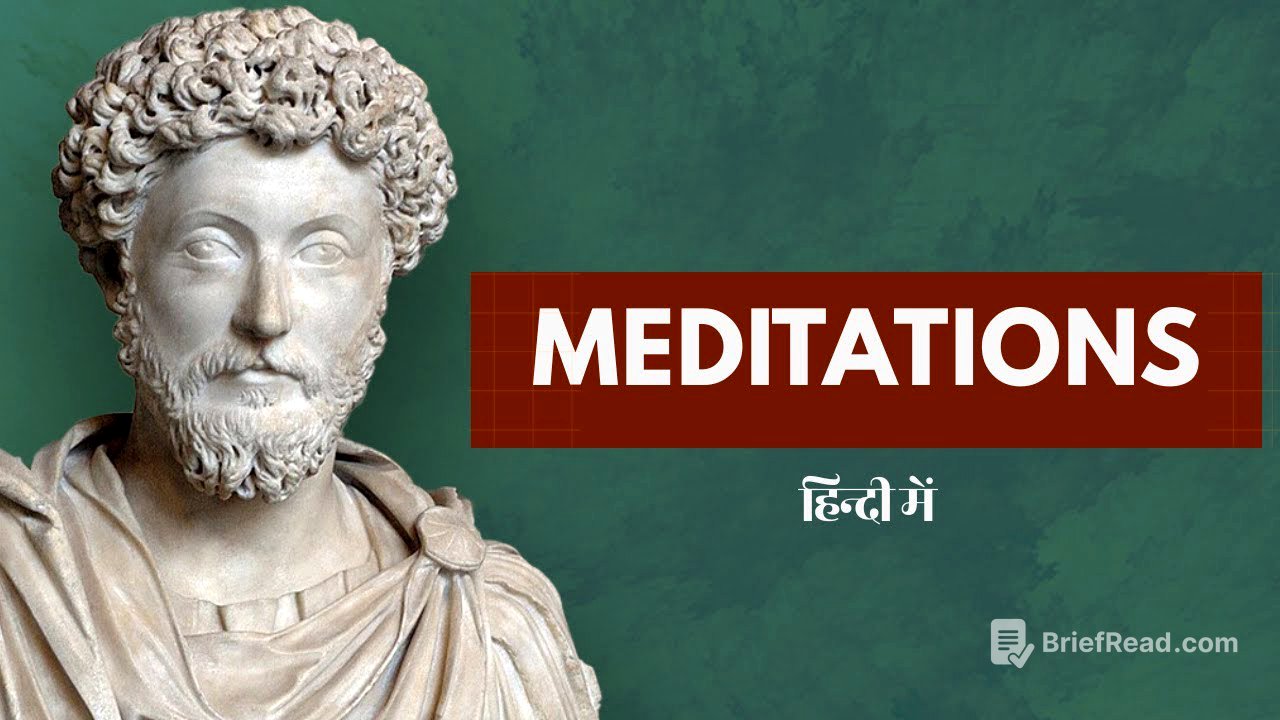TLDR;
This video provides a comprehensive overview of Marcus Aurelius, his life, his philosophical influences, and a detailed exploration of his book, Meditations. It covers his upbringing, education, political career, and military campaigns, as well as the philosophical background of Stoicism and its impact on Marcus's writings. The summary also examines the genre, structure, and style of Meditations, along with key themes and concepts discussed in each book.
- Marcus Aurelius' life and historical context
- Philosophical influences, particularly Stoicism
- Detailed analysis of "Meditations": structure, style, and key themes
- Practical application of Stoic principles in daily life
Introduction [0:00]
Marcus Aurelius, a Roman emperor for about 20 years and author of Meditations, is often seen as the embodiment of Plato's philosopher king. Despite his position, Marcus never considered himself a philosopher but rather an honest student trying to follow the philosophy of others. Born in AD 121, Marcus came from a respected family, with his grandfather holding the highest theoretical post in Rome. Raised by his grandfather after his father's early death, Marcus's childhood included interests in boxing, wrestling, running, and falconry.
Philosophical Background [27:50]
The time when Marcus wrote Meditations was a dark and stressful period in his life, filled with continuous battles, failed rebellions, and the deaths of loved ones. During this time, Marcus found solace in philosophy, particularly Stoicism. Unlike today, where philosophy is largely an academic subject, in Marcus's time, it was a practical guide for life, offering a system of beliefs and rules to live by, a role that ancient religion did not fulfill.
Stoicism and the Meditations [44:58]
Stoicism, originating from Athens with Zeno, is a Hellenistic system providing a proper belief system and life rules. A key tenet is the belief in a rational, orderly world controlled by "Logos," a force synonymous with logic, reason, Nature, Providence, or God. Logos dictates events in a cause-and-effect chain, making Stoicism deterministic. While seemingly negating free will and moral responsibility, Stoics define free will as choosing to align with what will happen anyway. Logos is not just an invisible power but a real substance, "Pure Fire," or a mix of fire and air, called "Numina," a living breath that animates all things.
The MEDITATIONS: Genre, Structure, and Style [1:09:42]
Meditations, not the original title, is a collection of random notes written in Greek, never intended for publication. Marcus likely never titled or considered it a proper book. The work mentions unclear events and people, even to contemporary readers, and includes direct thoughts about Marcus's role as emperor, making it a personal reflection rather than a general text. It is best categorized as spiritual exercises for handling daily stress and confusion, a self-help book in the truest sense.
Book 1: Debts and Lessons [1:44:15]
Book One of Meditations differs from the others, presenting a more autobiographical and structured reflection. It comprises 17 entries where Marcus remembers and acknowledges the individuals from whom he learned valuable lessons. The entries follow a sequence, starting with older relatives, then teachers, his adoptive father Antoninus, and finally, the gods. This logical arrangement and increasing entry size suggest a deliberate structure by Marcus, potentially indicating that Book One was conceived as a complete unit.
Book 2: On the River Gran, Among the Quadi [2:01:46]
When waking up in the morning, remind yourself that you will meet difficult people who are arrogant, liars, jealous, and conservative because they don't know the difference between good and evil. However, you do, and you understand that these people are part of the same nature as you, sharing the same mind and divine spark. Therefore, no one can truly harm you or make you hate them. We are all born to work together, like parts of the body, and obstructing each other is against nature.
Book 3: In Carnuntum [2:16:38]
It's not just that every day, some part of our life is ending and there is very little left, but you should also think about whether, if we live a long life, our mind will still be capable of understanding divine and human things. If our mind starts wandering, even if we still breathe, eat, think, and feel, the real work of the brain—using itself to its fullest, understanding what needs to be done, watching, listening, analyzing, and deciding—will be gone. So, we must hurry up, not just because we are going to death every day, but also because the strength to understand may not last long before death.
Book 4 [2:33:51]
The power within us, when it follows nature, adapts itself to every situation and doesn't need anything special. It gets its work done under all circumstances, turning obstacles into fuel, like a big fire that burns even what would extinguish a small lamp. Don't do anything without thinking, and no work can be done without a strong base. People often run away to the countryside, but you can find peace anytime by going inside your own soul.
Book 5 [3:01:09]
When you don't feel like getting up in the morning, tell yourself that you have to go to work as a human being. What do you have to complain about if you're going to do what you were born to do? Are you made just to feel good? You've seen plants, birds, ants, spiders, and bees doing their work. Are you refusing to fulfill your duty as a human being? You're running away from what your nature tells you to do.
Book 6 [3:27:39]
Nature is soft, and those who run it have no power to do any harm. They know neither evil nor do they harm anyone. It all starts and ends with what he says. It's just important that you do the right thing. Everything else doesn't matter, be it cold or hot, tired or fresh. Do people hate you or respect you? Are you dying or busy doing something? Because dying is also a part of life. Do what needs to be done there. Look inside yourself for the real thing. Don't miss the value or nature.
Book 7 [3:55:19]
Evil is the same old thing, no matter what. Remember this. It's all the same old stuff, from one end of the world to the other. Complete history books are full of these. Old and new, in cities and in every home, nothing new in the place. A familiar little moment cannot quench understanding, as long as you don't destroy the light that makes it happen. But you can turn on the light again, as embers.
Book 8 [4:24:29]
Don't be carried away by the entirety of what you have in front of you. Instead, retreat into yourself as much as you can, and by not straying, assess things as a man, as a human being, as a citizen, as a mortal. But among the things that are available to you for assessment, have these two at the ready: first, that things don't touch the soul, because they stay outside it and disturbances don't arise from anywhere but from one's judgment within; second, to look at what you see now and at what is passing, and to remember that you have experienced countless things like it.
Book 9 [4:56:15]
To do injustice is to be impious. For since universal nature has made rational animals for each other's sake, so that they may help one another according to their deserts, never harming one another in any way, those who transgress its will are plainly guilty of impiety toward the most venerable of divinities. For also falsehood is impiety, working injustice through deceit; and so is he who pursues pleasure as a good, and he who avoids pain as an evil.
Book 10 [5:21:46]
Will you, my soul, ever be good, simple, single, naked, plainer to see than the body which surrounds you? Will you ever taste the disposition of loving and affectionate, ever be filled, never craving, never desiring anything, whether animate or inanimate, for the indulgence of your appetites, never wanting time for your pleasures, or place, or agreeable climate, or the society of men? Will you be content with your present condition, and pleased with everything that surrounds you, persuaded that you have everything, and that all comes from the gods, and that all is well for you, and will be well, whatever shall please them to give and order for the conservation of the Perfect Being—the good, and just, and beautiful, and generative, and connective, and conservative of all things that are dissolved for the production of others like themselves?
Book 11 [5:49:39]
What are these principles that are in you that you pay attention to? The mind that is in you, what kind of mind is it? What is it that you are making of it? You are like a soul that is being used by a child, a teenager, a woman, a tyrant, a domestic animal, or a wild beast. What are the things that most people consider to be good? Are these things good for you? If you are thinking about these things, then you are not using your mind in the right way.
Book 12 [6:11:08]
Soon you will be either ashes or a skeleton, and at most a name, or not even that. Fame is just a sound and an echo. The things we want in life are empty, boring, and useless. Dogs barking at each other, kids fighting, laughing one moment, crying the next. Trust, shame, justice, truth, everything has vanished. Only the top of the ground is left. So why are you here until then?









